The Constitution of the United Kingdom: Written or Unwritten?
VerifiedAdded on 2023/06/13
|9
|3079
|146
AI Summary
This essay discusses the debate on whether the United Kingdom has a written or unwritten constitution. It explores the characteristics of the UK constitution and the arguments for and against its existence. The essay argues that although the UK does not have a written constitution, it has certain constitutional characteristics and conventions that make it a constitution. It also discusses the advantages and disadvantages of having an unwritten constitution.
Contribute Materials
Your contribution can guide someone’s learning journey. Share your
documents today.
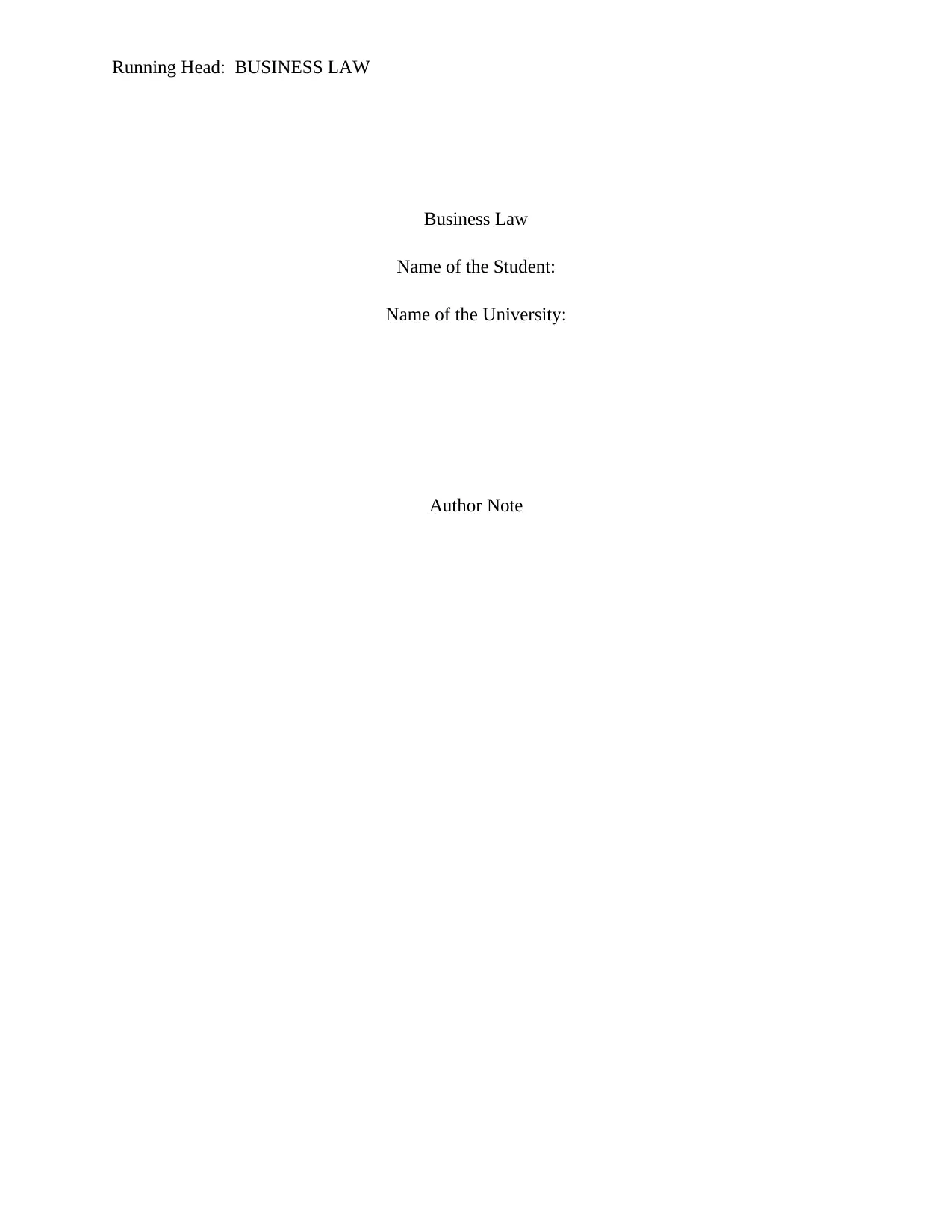
Running Head: BUSINESS LAW
Business Law
Name of the Student:
Name of the University:
Author Note
Business Law
Name of the Student:
Name of the University:
Author Note
Secure Best Marks with AI Grader
Need help grading? Try our AI Grader for instant feedback on your assignments.
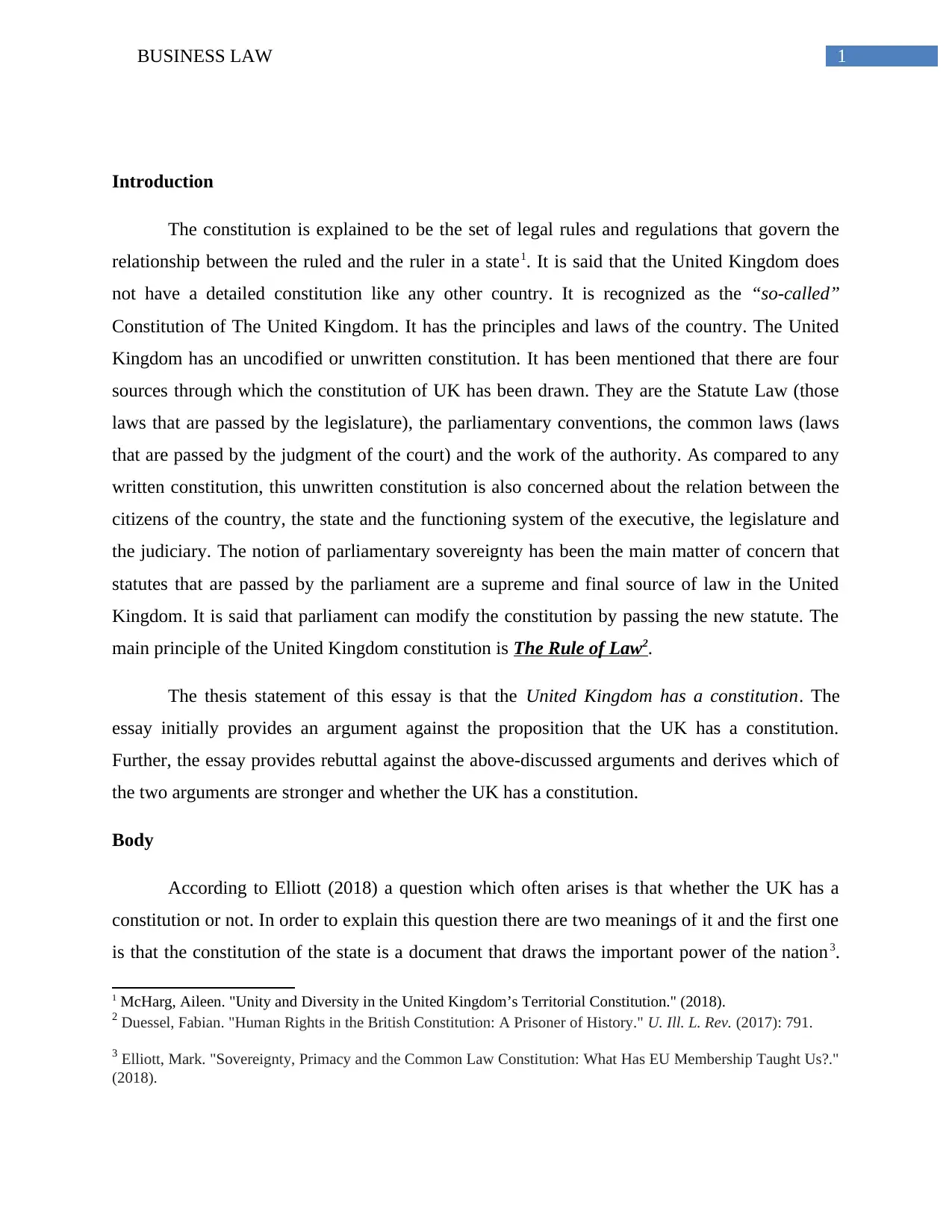
1BUSINESS LAW
Introduction
The constitution is explained to be the set of legal rules and regulations that govern the
relationship between the ruled and the ruler in a state1. It is said that the United Kingdom does
not have a detailed constitution like any other country. It is recognized as the “so-called”
Constitution of The United Kingdom. It has the principles and laws of the country. The United
Kingdom has an uncodified or unwritten constitution. It has been mentioned that there are four
sources through which the constitution of UK has been drawn. They are the Statute Law (those
laws that are passed by the legislature), the parliamentary conventions, the common laws (laws
that are passed by the judgment of the court) and the work of the authority. As compared to any
written constitution, this unwritten constitution is also concerned about the relation between the
citizens of the country, the state and the functioning system of the executive, the legislature and
the judiciary. The notion of parliamentary sovereignty has been the main matter of concern that
statutes that are passed by the parliament are a supreme and final source of law in the United
Kingdom. It is said that parliament can modify the constitution by passing the new statute. The
main principle of the United Kingdom constitution is The Rule of Law2.
The thesis statement of this essay is that the United Kingdom has a constitution. The
essay initially provides an argument against the proposition that the UK has a constitution.
Further, the essay provides rebuttal against the above-discussed arguments and derives which of
the two arguments are stronger and whether the UK has a constitution.
Body
According to Elliott (2018) a question which often arises is that whether the UK has a
constitution or not. In order to explain this question there are two meanings of it and the first one
is that the constitution of the state is a document that draws the important power of the nation3.
1 McHarg, Aileen. "Unity and Diversity in the United Kingdom’s Territorial Constitution." (2018).
2 Duessel, Fabian. "Human Rights in the British Constitution: A Prisoner of History." U. Ill. L. Rev. (2017): 791.
3 Elliott, Mark. "Sovereignty, Primacy and the Common Law Constitution: What Has EU Membership Taught Us?."
(2018).
Introduction
The constitution is explained to be the set of legal rules and regulations that govern the
relationship between the ruled and the ruler in a state1. It is said that the United Kingdom does
not have a detailed constitution like any other country. It is recognized as the “so-called”
Constitution of The United Kingdom. It has the principles and laws of the country. The United
Kingdom has an uncodified or unwritten constitution. It has been mentioned that there are four
sources through which the constitution of UK has been drawn. They are the Statute Law (those
laws that are passed by the legislature), the parliamentary conventions, the common laws (laws
that are passed by the judgment of the court) and the work of the authority. As compared to any
written constitution, this unwritten constitution is also concerned about the relation between the
citizens of the country, the state and the functioning system of the executive, the legislature and
the judiciary. The notion of parliamentary sovereignty has been the main matter of concern that
statutes that are passed by the parliament are a supreme and final source of law in the United
Kingdom. It is said that parliament can modify the constitution by passing the new statute. The
main principle of the United Kingdom constitution is The Rule of Law2.
The thesis statement of this essay is that the United Kingdom has a constitution. The
essay initially provides an argument against the proposition that the UK has a constitution.
Further, the essay provides rebuttal against the above-discussed arguments and derives which of
the two arguments are stronger and whether the UK has a constitution.
Body
According to Elliott (2018) a question which often arises is that whether the UK has a
constitution or not. In order to explain this question there are two meanings of it and the first one
is that the constitution of the state is a document that draws the important power of the nation3.
1 McHarg, Aileen. "Unity and Diversity in the United Kingdom’s Territorial Constitution." (2018).
2 Duessel, Fabian. "Human Rights in the British Constitution: A Prisoner of History." U. Ill. L. Rev. (2017): 791.
3 Elliott, Mark. "Sovereignty, Primacy and the Common Law Constitution: What Has EU Membership Taught Us?."
(2018).
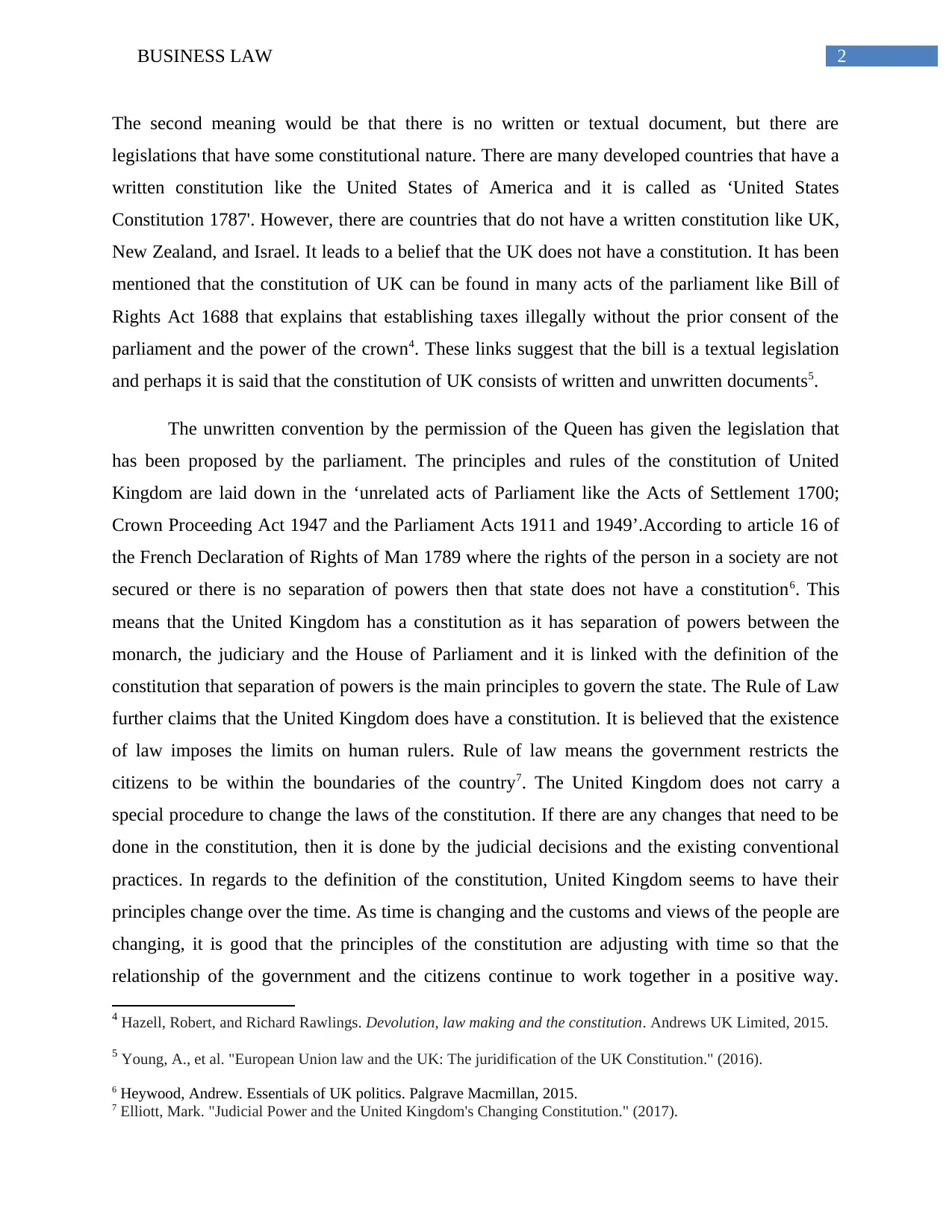
2BUSINESS LAW
The second meaning would be that there is no written or textual document, but there are
legislations that have some constitutional nature. There are many developed countries that have a
written constitution like the United States of America and it is called as ‘United States
Constitution 1787'. However, there are countries that do not have a written constitution like UK,
New Zealand, and Israel. It leads to a belief that the UK does not have a constitution. It has been
mentioned that the constitution of UK can be found in many acts of the parliament like Bill of
Rights Act 1688 that explains that establishing taxes illegally without the prior consent of the
parliament and the power of the crown4. These links suggest that the bill is a textual legislation
and perhaps it is said that the constitution of UK consists of written and unwritten documents5.
The unwritten convention by the permission of the Queen has given the legislation that
has been proposed by the parliament. The principles and rules of the constitution of United
Kingdom are laid down in the ‘unrelated acts of Parliament like the Acts of Settlement 1700;
Crown Proceeding Act 1947 and the Parliament Acts 1911 and 1949’.According to article 16 of
the French Declaration of Rights of Man 1789 where the rights of the person in a society are not
secured or there is no separation of powers then that state does not have a constitution6. This
means that the United Kingdom has a constitution as it has separation of powers between the
monarch, the judiciary and the House of Parliament and it is linked with the definition of the
constitution that separation of powers is the main principles to govern the state. The Rule of Law
further claims that the United Kingdom does have a constitution. It is believed that the existence
of law imposes the limits on human rulers. Rule of law means the government restricts the
citizens to be within the boundaries of the country7. The United Kingdom does not carry a
special procedure to change the laws of the constitution. If there are any changes that need to be
done in the constitution, then it is done by the judicial decisions and the existing conventional
practices. In regards to the definition of the constitution, United Kingdom seems to have their
principles change over the time. As time is changing and the customs and views of the people are
changing, it is good that the principles of the constitution are adjusting with time so that the
relationship of the government and the citizens continue to work together in a positive way.
4 Hazell, Robert, and Richard Rawlings. Devolution, law making and the constitution. Andrews UK Limited, 2015.
5 Young, A., et al. "European Union law and the UK: The juridification of the UK Constitution." (2016).
6 Heywood, Andrew. Essentials of UK politics. Palgrave Macmillan, 2015.
7 Elliott, Mark. "Judicial Power and the United Kingdom's Changing Constitution." (2017).
The second meaning would be that there is no written or textual document, but there are
legislations that have some constitutional nature. There are many developed countries that have a
written constitution like the United States of America and it is called as ‘United States
Constitution 1787'. However, there are countries that do not have a written constitution like UK,
New Zealand, and Israel. It leads to a belief that the UK does not have a constitution. It has been
mentioned that the constitution of UK can be found in many acts of the parliament like Bill of
Rights Act 1688 that explains that establishing taxes illegally without the prior consent of the
parliament and the power of the crown4. These links suggest that the bill is a textual legislation
and perhaps it is said that the constitution of UK consists of written and unwritten documents5.
The unwritten convention by the permission of the Queen has given the legislation that
has been proposed by the parliament. The principles and rules of the constitution of United
Kingdom are laid down in the ‘unrelated acts of Parliament like the Acts of Settlement 1700;
Crown Proceeding Act 1947 and the Parliament Acts 1911 and 1949’.According to article 16 of
the French Declaration of Rights of Man 1789 where the rights of the person in a society are not
secured or there is no separation of powers then that state does not have a constitution6. This
means that the United Kingdom has a constitution as it has separation of powers between the
monarch, the judiciary and the House of Parliament and it is linked with the definition of the
constitution that separation of powers is the main principles to govern the state. The Rule of Law
further claims that the United Kingdom does have a constitution. It is believed that the existence
of law imposes the limits on human rulers. Rule of law means the government restricts the
citizens to be within the boundaries of the country7. The United Kingdom does not carry a
special procedure to change the laws of the constitution. If there are any changes that need to be
done in the constitution, then it is done by the judicial decisions and the existing conventional
practices. In regards to the definition of the constitution, United Kingdom seems to have their
principles change over the time. As time is changing and the customs and views of the people are
changing, it is good that the principles of the constitution are adjusting with time so that the
relationship of the government and the citizens continue to work together in a positive way.
4 Hazell, Robert, and Richard Rawlings. Devolution, law making and the constitution. Andrews UK Limited, 2015.
5 Young, A., et al. "European Union law and the UK: The juridification of the UK Constitution." (2016).
6 Heywood, Andrew. Essentials of UK politics. Palgrave Macmillan, 2015.
7 Elliott, Mark. "Judicial Power and the United Kingdom's Changing Constitution." (2017).
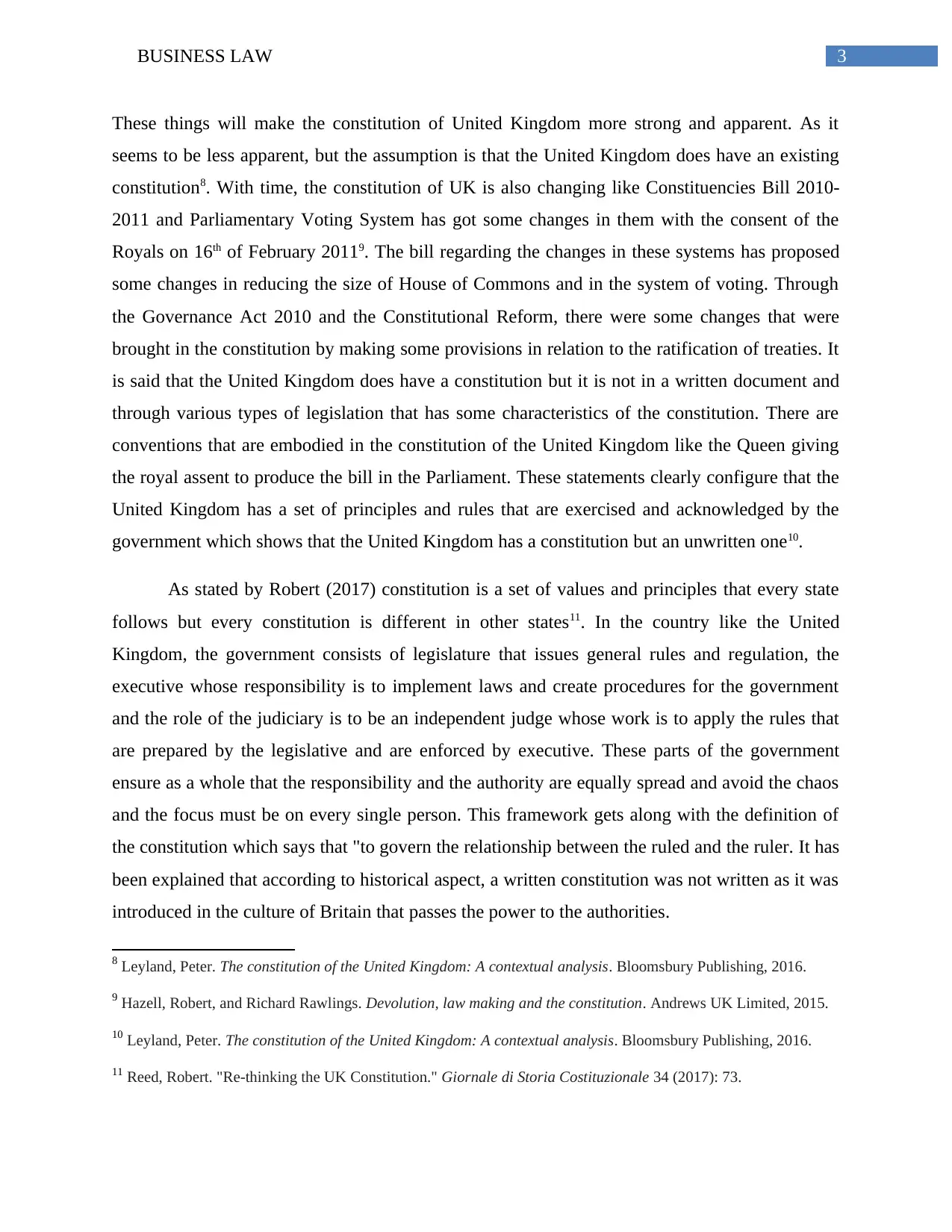
3BUSINESS LAW
These things will make the constitution of United Kingdom more strong and apparent. As it
seems to be less apparent, but the assumption is that the United Kingdom does have an existing
constitution8. With time, the constitution of UK is also changing like Constituencies Bill 2010-
2011 and Parliamentary Voting System has got some changes in them with the consent of the
Royals on 16th of February 20119. The bill regarding the changes in these systems has proposed
some changes in reducing the size of House of Commons and in the system of voting. Through
the Governance Act 2010 and the Constitutional Reform, there were some changes that were
brought in the constitution by making some provisions in relation to the ratification of treaties. It
is said that the United Kingdom does have a constitution but it is not in a written document and
through various types of legislation that has some characteristics of the constitution. There are
conventions that are embodied in the constitution of the United Kingdom like the Queen giving
the royal assent to produce the bill in the Parliament. These statements clearly configure that the
United Kingdom has a set of principles and rules that are exercised and acknowledged by the
government which shows that the United Kingdom has a constitution but an unwritten one10.
As stated by Robert (2017) constitution is a set of values and principles that every state
follows but every constitution is different in other states11. In the country like the United
Kingdom, the government consists of legislature that issues general rules and regulation, the
executive whose responsibility is to implement laws and create procedures for the government
and the role of the judiciary is to be an independent judge whose work is to apply the rules that
are prepared by the legislative and are enforced by executive. These parts of the government
ensure as a whole that the responsibility and the authority are equally spread and avoid the chaos
and the focus must be on every single person. This framework gets along with the definition of
the constitution which says that "to govern the relationship between the ruled and the ruler. It has
been explained that according to historical aspect, a written constitution was not written as it was
introduced in the culture of Britain that passes the power to the authorities.
8 Leyland, Peter. The constitution of the United Kingdom: A contextual analysis. Bloomsbury Publishing, 2016.
9 Hazell, Robert, and Richard Rawlings. Devolution, law making and the constitution. Andrews UK Limited, 2015.
10 Leyland, Peter. The constitution of the United Kingdom: A contextual analysis. Bloomsbury Publishing, 2016.
11 Reed, Robert. "Re-thinking the UK Constitution." Giornale di Storia Costituzionale 34 (2017): 73.
These things will make the constitution of United Kingdom more strong and apparent. As it
seems to be less apparent, but the assumption is that the United Kingdom does have an existing
constitution8. With time, the constitution of UK is also changing like Constituencies Bill 2010-
2011 and Parliamentary Voting System has got some changes in them with the consent of the
Royals on 16th of February 20119. The bill regarding the changes in these systems has proposed
some changes in reducing the size of House of Commons and in the system of voting. Through
the Governance Act 2010 and the Constitutional Reform, there were some changes that were
brought in the constitution by making some provisions in relation to the ratification of treaties. It
is said that the United Kingdom does have a constitution but it is not in a written document and
through various types of legislation that has some characteristics of the constitution. There are
conventions that are embodied in the constitution of the United Kingdom like the Queen giving
the royal assent to produce the bill in the Parliament. These statements clearly configure that the
United Kingdom has a set of principles and rules that are exercised and acknowledged by the
government which shows that the United Kingdom has a constitution but an unwritten one10.
As stated by Robert (2017) constitution is a set of values and principles that every state
follows but every constitution is different in other states11. In the country like the United
Kingdom, the government consists of legislature that issues general rules and regulation, the
executive whose responsibility is to implement laws and create procedures for the government
and the role of the judiciary is to be an independent judge whose work is to apply the rules that
are prepared by the legislative and are enforced by executive. These parts of the government
ensure as a whole that the responsibility and the authority are equally spread and avoid the chaos
and the focus must be on every single person. This framework gets along with the definition of
the constitution which says that "to govern the relationship between the ruled and the ruler. It has
been explained that according to historical aspect, a written constitution was not written as it was
introduced in the culture of Britain that passes the power to the authorities.
8 Leyland, Peter. The constitution of the United Kingdom: A contextual analysis. Bloomsbury Publishing, 2016.
9 Hazell, Robert, and Richard Rawlings. Devolution, law making and the constitution. Andrews UK Limited, 2015.
10 Leyland, Peter. The constitution of the United Kingdom: A contextual analysis. Bloomsbury Publishing, 2016.
11 Reed, Robert. "Re-thinking the UK Constitution." Giornale di Storia Costituzionale 34 (2017): 73.
Secure Best Marks with AI Grader
Need help grading? Try our AI Grader for instant feedback on your assignments.
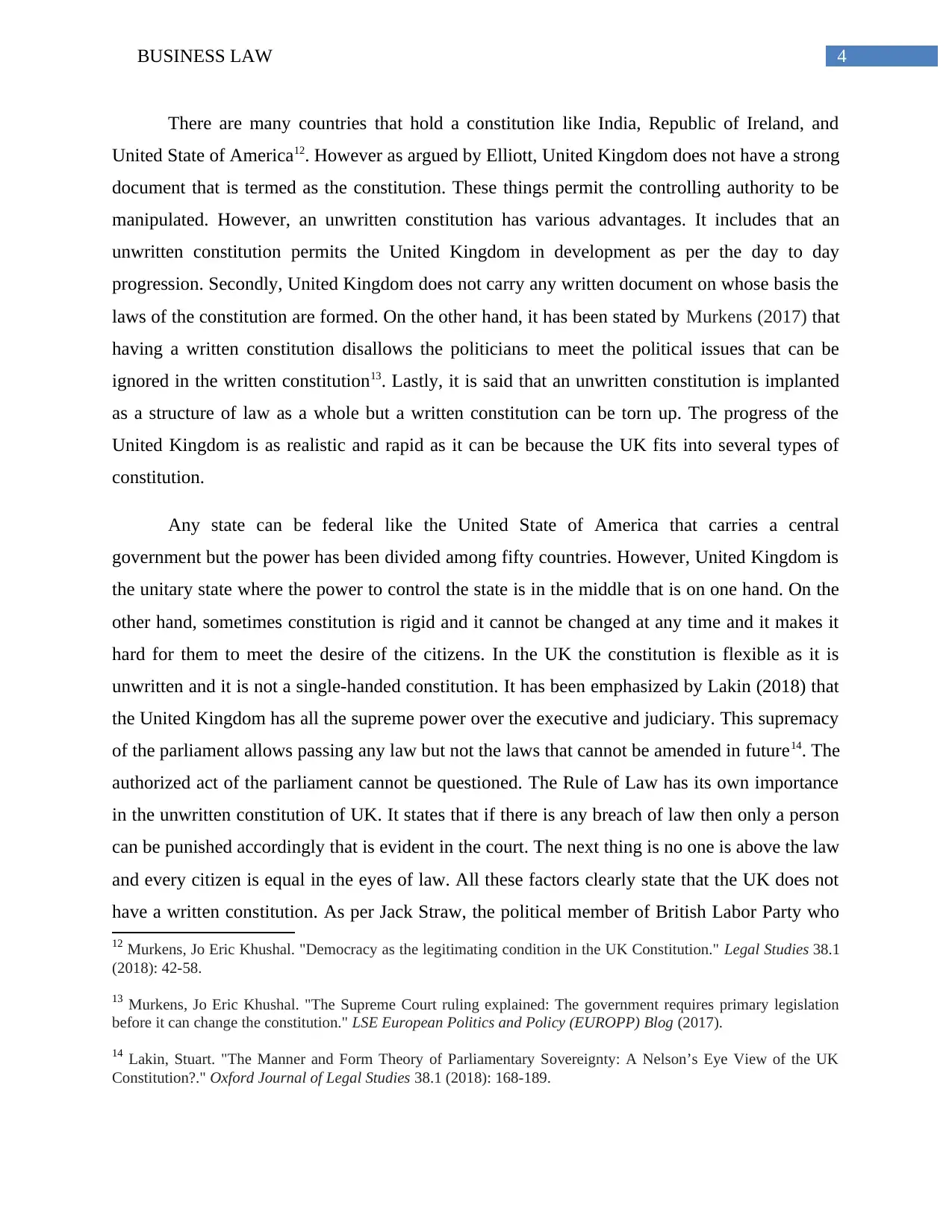
4BUSINESS LAW
There are many countries that hold a constitution like India, Republic of Ireland, and
United State of America12. However as argued by Elliott, United Kingdom does not have a strong
document that is termed as the constitution. These things permit the controlling authority to be
manipulated. However, an unwritten constitution has various advantages. It includes that an
unwritten constitution permits the United Kingdom in development as per the day to day
progression. Secondly, United Kingdom does not carry any written document on whose basis the
laws of the constitution are formed. On the other hand, it has been stated by Murkens (2017) that
having a written constitution disallows the politicians to meet the political issues that can be
ignored in the written constitution13. Lastly, it is said that an unwritten constitution is implanted
as a structure of law as a whole but a written constitution can be torn up. The progress of the
United Kingdom is as realistic and rapid as it can be because the UK fits into several types of
constitution.
Any state can be federal like the United State of America that carries a central
government but the power has been divided among fifty countries. However, United Kingdom is
the unitary state where the power to control the state is in the middle that is on one hand. On the
other hand, sometimes constitution is rigid and it cannot be changed at any time and it makes it
hard for them to meet the desire of the citizens. In the UK the constitution is flexible as it is
unwritten and it is not a single-handed constitution. It has been emphasized by Lakin (2018) that
the United Kingdom has all the supreme power over the executive and judiciary. This supremacy
of the parliament allows passing any law but not the laws that cannot be amended in future14. The
authorized act of the parliament cannot be questioned. The Rule of Law has its own importance
in the unwritten constitution of UK. It states that if there is any breach of law then only a person
can be punished accordingly that is evident in the court. The next thing is no one is above the law
and every citizen is equal in the eyes of law. All these factors clearly state that the UK does not
have a written constitution. As per Jack Straw, the political member of British Labor Party who
12 Murkens, Jo Eric Khushal. "Democracy as the legitimating condition in the UK Constitution." Legal Studies 38.1
(2018): 42-58.
13 Murkens, Jo Eric Khushal. "The Supreme Court ruling explained: The government requires primary legislation
before it can change the constitution." LSE European Politics and Policy (EUROPP) Blog (2017).
14 Lakin, Stuart. "The Manner and Form Theory of Parliamentary Sovereignty: A Nelson’s Eye View of the UK
Constitution?." Oxford Journal of Legal Studies 38.1 (2018): 168-189.
There are many countries that hold a constitution like India, Republic of Ireland, and
United State of America12. However as argued by Elliott, United Kingdom does not have a strong
document that is termed as the constitution. These things permit the controlling authority to be
manipulated. However, an unwritten constitution has various advantages. It includes that an
unwritten constitution permits the United Kingdom in development as per the day to day
progression. Secondly, United Kingdom does not carry any written document on whose basis the
laws of the constitution are formed. On the other hand, it has been stated by Murkens (2017) that
having a written constitution disallows the politicians to meet the political issues that can be
ignored in the written constitution13. Lastly, it is said that an unwritten constitution is implanted
as a structure of law as a whole but a written constitution can be torn up. The progress of the
United Kingdom is as realistic and rapid as it can be because the UK fits into several types of
constitution.
Any state can be federal like the United State of America that carries a central
government but the power has been divided among fifty countries. However, United Kingdom is
the unitary state where the power to control the state is in the middle that is on one hand. On the
other hand, sometimes constitution is rigid and it cannot be changed at any time and it makes it
hard for them to meet the desire of the citizens. In the UK the constitution is flexible as it is
unwritten and it is not a single-handed constitution. It has been emphasized by Lakin (2018) that
the United Kingdom has all the supreme power over the executive and judiciary. This supremacy
of the parliament allows passing any law but not the laws that cannot be amended in future14. The
authorized act of the parliament cannot be questioned. The Rule of Law has its own importance
in the unwritten constitution of UK. It states that if there is any breach of law then only a person
can be punished accordingly that is evident in the court. The next thing is no one is above the law
and every citizen is equal in the eyes of law. All these factors clearly state that the UK does not
have a written constitution. As per Jack Straw, the political member of British Labor Party who
12 Murkens, Jo Eric Khushal. "Democracy as the legitimating condition in the UK Constitution." Legal Studies 38.1
(2018): 42-58.
13 Murkens, Jo Eric Khushal. "The Supreme Court ruling explained: The government requires primary legislation
before it can change the constitution." LSE European Politics and Policy (EUROPP) Blog (2017).
14 Lakin, Stuart. "The Manner and Form Theory of Parliamentary Sovereignty: A Nelson’s Eye View of the UK
Constitution?." Oxford Journal of Legal Studies 38.1 (2018): 168-189.
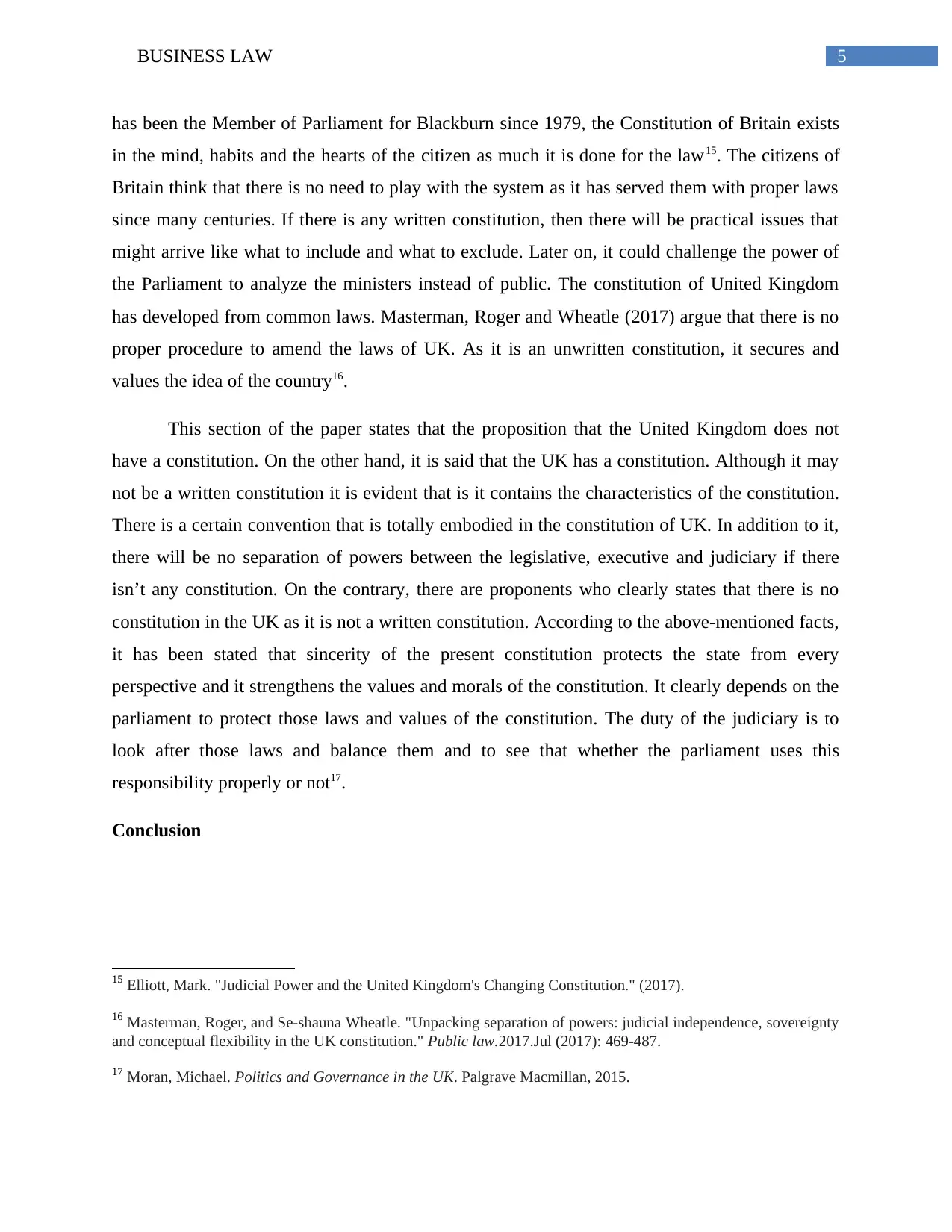
5BUSINESS LAW
has been the Member of Parliament for Blackburn since 1979, the Constitution of Britain exists
in the mind, habits and the hearts of the citizen as much it is done for the law15. The citizens of
Britain think that there is no need to play with the system as it has served them with proper laws
since many centuries. If there is any written constitution, then there will be practical issues that
might arrive like what to include and what to exclude. Later on, it could challenge the power of
the Parliament to analyze the ministers instead of public. The constitution of United Kingdom
has developed from common laws. Masterman, Roger and Wheatle (2017) argue that there is no
proper procedure to amend the laws of UK. As it is an unwritten constitution, it secures and
values the idea of the country16.
This section of the paper states that the proposition that the United Kingdom does not
have a constitution. On the other hand, it is said that the UK has a constitution. Although it may
not be a written constitution it is evident that is it contains the characteristics of the constitution.
There is a certain convention that is totally embodied in the constitution of UK. In addition to it,
there will be no separation of powers between the legislative, executive and judiciary if there
isn’t any constitution. On the contrary, there are proponents who clearly states that there is no
constitution in the UK as it is not a written constitution. According to the above-mentioned facts,
it has been stated that sincerity of the present constitution protects the state from every
perspective and it strengthens the values and morals of the constitution. It clearly depends on the
parliament to protect those laws and values of the constitution. The duty of the judiciary is to
look after those laws and balance them and to see that whether the parliament uses this
responsibility properly or not17.
Conclusion
15 Elliott, Mark. "Judicial Power and the United Kingdom's Changing Constitution." (2017).
16 Masterman, Roger, and Se-shauna Wheatle. "Unpacking separation of powers: judicial independence, sovereignty
and conceptual flexibility in the UK constitution." Public law.2017.Jul (2017): 469-487.
17 Moran, Michael. Politics and Governance in the UK. Palgrave Macmillan, 2015.
has been the Member of Parliament for Blackburn since 1979, the Constitution of Britain exists
in the mind, habits and the hearts of the citizen as much it is done for the law15. The citizens of
Britain think that there is no need to play with the system as it has served them with proper laws
since many centuries. If there is any written constitution, then there will be practical issues that
might arrive like what to include and what to exclude. Later on, it could challenge the power of
the Parliament to analyze the ministers instead of public. The constitution of United Kingdom
has developed from common laws. Masterman, Roger and Wheatle (2017) argue that there is no
proper procedure to amend the laws of UK. As it is an unwritten constitution, it secures and
values the idea of the country16.
This section of the paper states that the proposition that the United Kingdom does not
have a constitution. On the other hand, it is said that the UK has a constitution. Although it may
not be a written constitution it is evident that is it contains the characteristics of the constitution.
There is a certain convention that is totally embodied in the constitution of UK. In addition to it,
there will be no separation of powers between the legislative, executive and judiciary if there
isn’t any constitution. On the contrary, there are proponents who clearly states that there is no
constitution in the UK as it is not a written constitution. According to the above-mentioned facts,
it has been stated that sincerity of the present constitution protects the state from every
perspective and it strengthens the values and morals of the constitution. It clearly depends on the
parliament to protect those laws and values of the constitution. The duty of the judiciary is to
look after those laws and balance them and to see that whether the parliament uses this
responsibility properly or not17.
Conclusion
15 Elliott, Mark. "Judicial Power and the United Kingdom's Changing Constitution." (2017).
16 Masterman, Roger, and Se-shauna Wheatle. "Unpacking separation of powers: judicial independence, sovereignty
and conceptual flexibility in the UK constitution." Public law.2017.Jul (2017): 469-487.
17 Moran, Michael. Politics and Governance in the UK. Palgrave Macmillan, 2015.
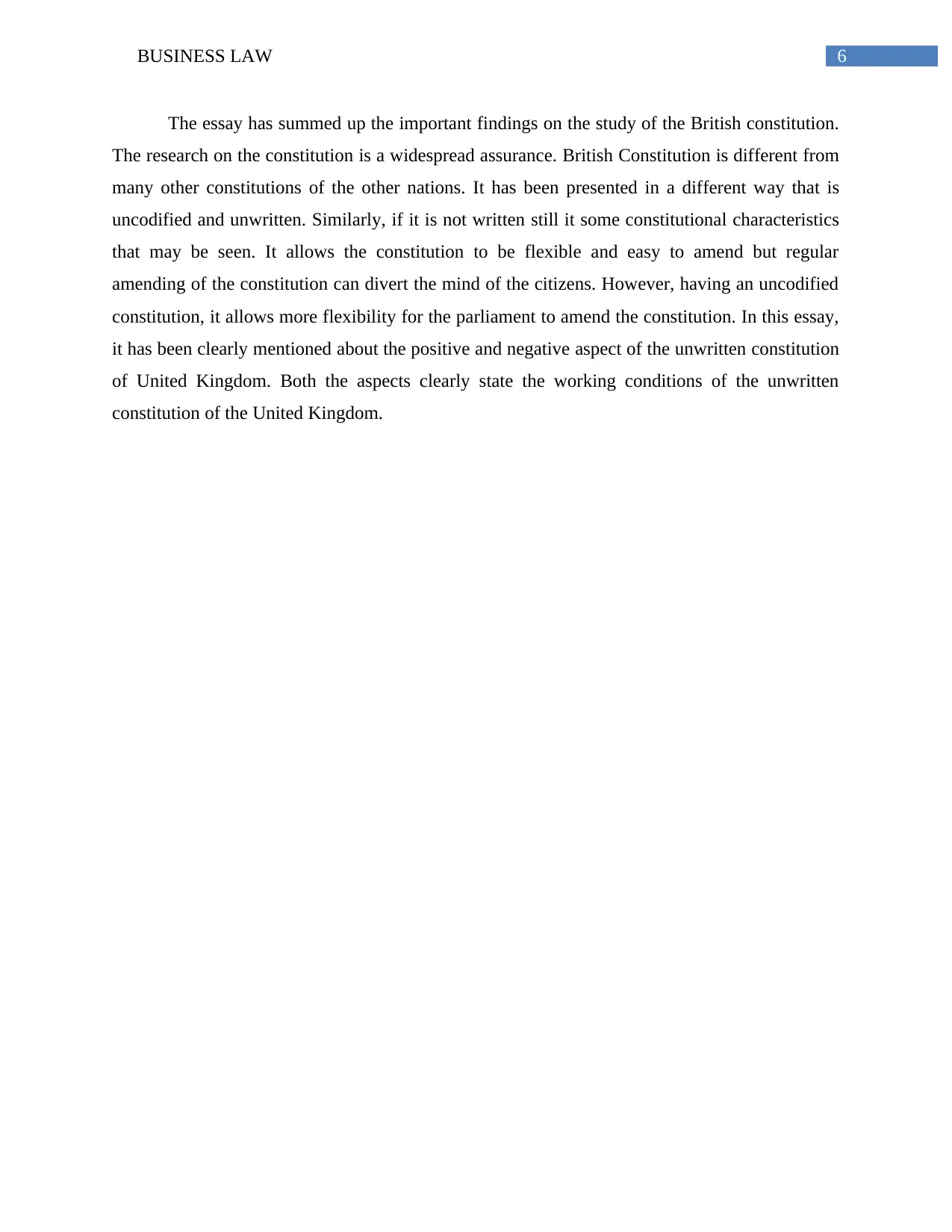
6BUSINESS LAW
The essay has summed up the important findings on the study of the British constitution.
The research on the constitution is a widespread assurance. British Constitution is different from
many other constitutions of the other nations. It has been presented in a different way that is
uncodified and unwritten. Similarly, if it is not written still it some constitutional characteristics
that may be seen. It allows the constitution to be flexible and easy to amend but regular
amending of the constitution can divert the mind of the citizens. However, having an uncodified
constitution, it allows more flexibility for the parliament to amend the constitution. In this essay,
it has been clearly mentioned about the positive and negative aspect of the unwritten constitution
of United Kingdom. Both the aspects clearly state the working conditions of the unwritten
constitution of the United Kingdom.
The essay has summed up the important findings on the study of the British constitution.
The research on the constitution is a widespread assurance. British Constitution is different from
many other constitutions of the other nations. It has been presented in a different way that is
uncodified and unwritten. Similarly, if it is not written still it some constitutional characteristics
that may be seen. It allows the constitution to be flexible and easy to amend but regular
amending of the constitution can divert the mind of the citizens. However, having an uncodified
constitution, it allows more flexibility for the parliament to amend the constitution. In this essay,
it has been clearly mentioned about the positive and negative aspect of the unwritten constitution
of United Kingdom. Both the aspects clearly state the working conditions of the unwritten
constitution of the United Kingdom.
Paraphrase This Document
Need a fresh take? Get an instant paraphrase of this document with our AI Paraphraser
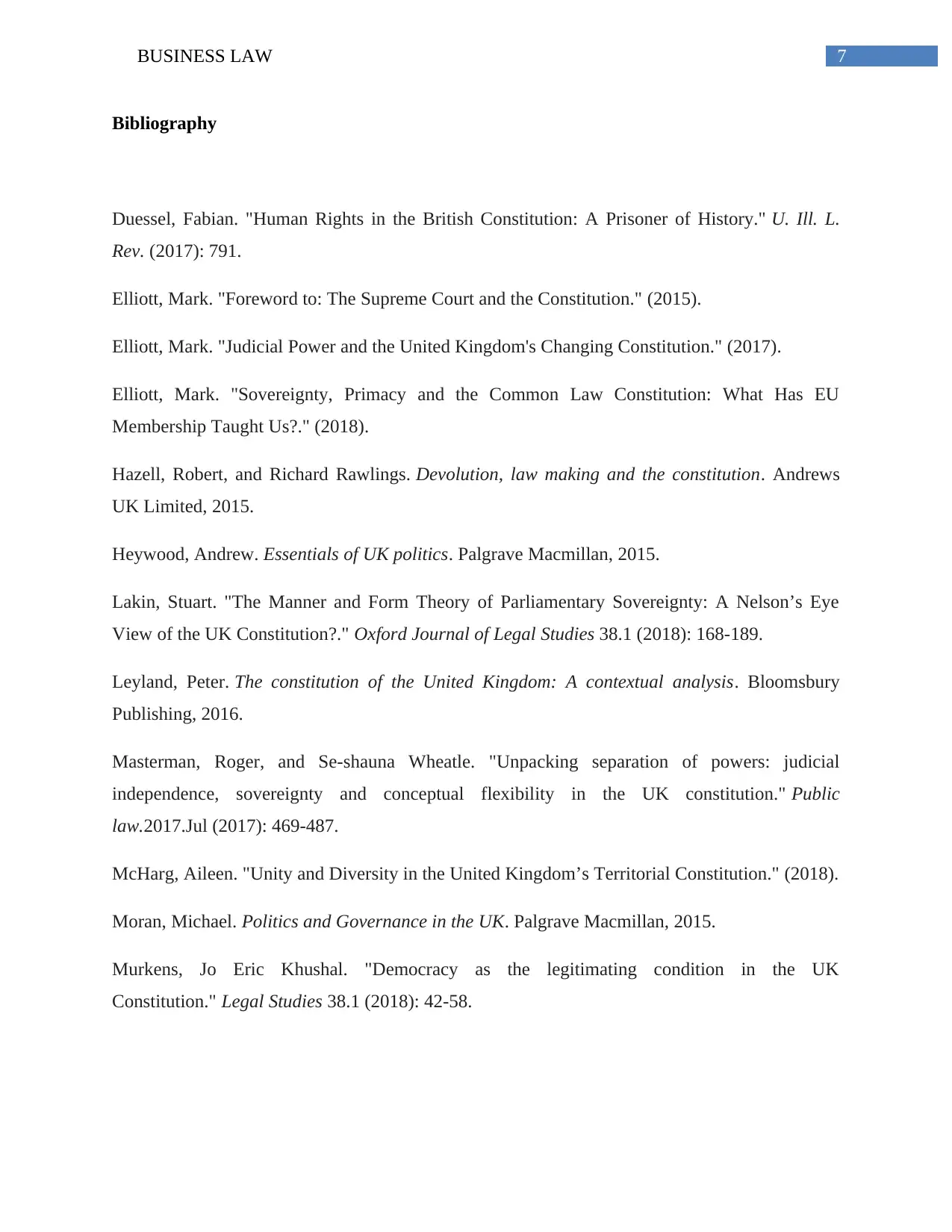
7BUSINESS LAW
Bibliography
Duessel, Fabian. "Human Rights in the British Constitution: A Prisoner of History." U. Ill. L.
Rev. (2017): 791.
Elliott, Mark. "Foreword to: The Supreme Court and the Constitution." (2015).
Elliott, Mark. "Judicial Power and the United Kingdom's Changing Constitution." (2017).
Elliott, Mark. "Sovereignty, Primacy and the Common Law Constitution: What Has EU
Membership Taught Us?." (2018).
Hazell, Robert, and Richard Rawlings. Devolution, law making and the constitution. Andrews
UK Limited, 2015.
Heywood, Andrew. Essentials of UK politics. Palgrave Macmillan, 2015.
Lakin, Stuart. "The Manner and Form Theory of Parliamentary Sovereignty: A Nelson’s Eye
View of the UK Constitution?." Oxford Journal of Legal Studies 38.1 (2018): 168-189.
Leyland, Peter. The constitution of the United Kingdom: A contextual analysis. Bloomsbury
Publishing, 2016.
Masterman, Roger, and Se-shauna Wheatle. "Unpacking separation of powers: judicial
independence, sovereignty and conceptual flexibility in the UK constitution." Public
law.2017.Jul (2017): 469-487.
McHarg, Aileen. "Unity and Diversity in the United Kingdom’s Territorial Constitution." (2018).
Moran, Michael. Politics and Governance in the UK. Palgrave Macmillan, 2015.
Murkens, Jo Eric Khushal. "Democracy as the legitimating condition in the UK
Constitution." Legal Studies 38.1 (2018): 42-58.
Bibliography
Duessel, Fabian. "Human Rights in the British Constitution: A Prisoner of History." U. Ill. L.
Rev. (2017): 791.
Elliott, Mark. "Foreword to: The Supreme Court and the Constitution." (2015).
Elliott, Mark. "Judicial Power and the United Kingdom's Changing Constitution." (2017).
Elliott, Mark. "Sovereignty, Primacy and the Common Law Constitution: What Has EU
Membership Taught Us?." (2018).
Hazell, Robert, and Richard Rawlings. Devolution, law making and the constitution. Andrews
UK Limited, 2015.
Heywood, Andrew. Essentials of UK politics. Palgrave Macmillan, 2015.
Lakin, Stuart. "The Manner and Form Theory of Parliamentary Sovereignty: A Nelson’s Eye
View of the UK Constitution?." Oxford Journal of Legal Studies 38.1 (2018): 168-189.
Leyland, Peter. The constitution of the United Kingdom: A contextual analysis. Bloomsbury
Publishing, 2016.
Masterman, Roger, and Se-shauna Wheatle. "Unpacking separation of powers: judicial
independence, sovereignty and conceptual flexibility in the UK constitution." Public
law.2017.Jul (2017): 469-487.
McHarg, Aileen. "Unity and Diversity in the United Kingdom’s Territorial Constitution." (2018).
Moran, Michael. Politics and Governance in the UK. Palgrave Macmillan, 2015.
Murkens, Jo Eric Khushal. "Democracy as the legitimating condition in the UK
Constitution." Legal Studies 38.1 (2018): 42-58.
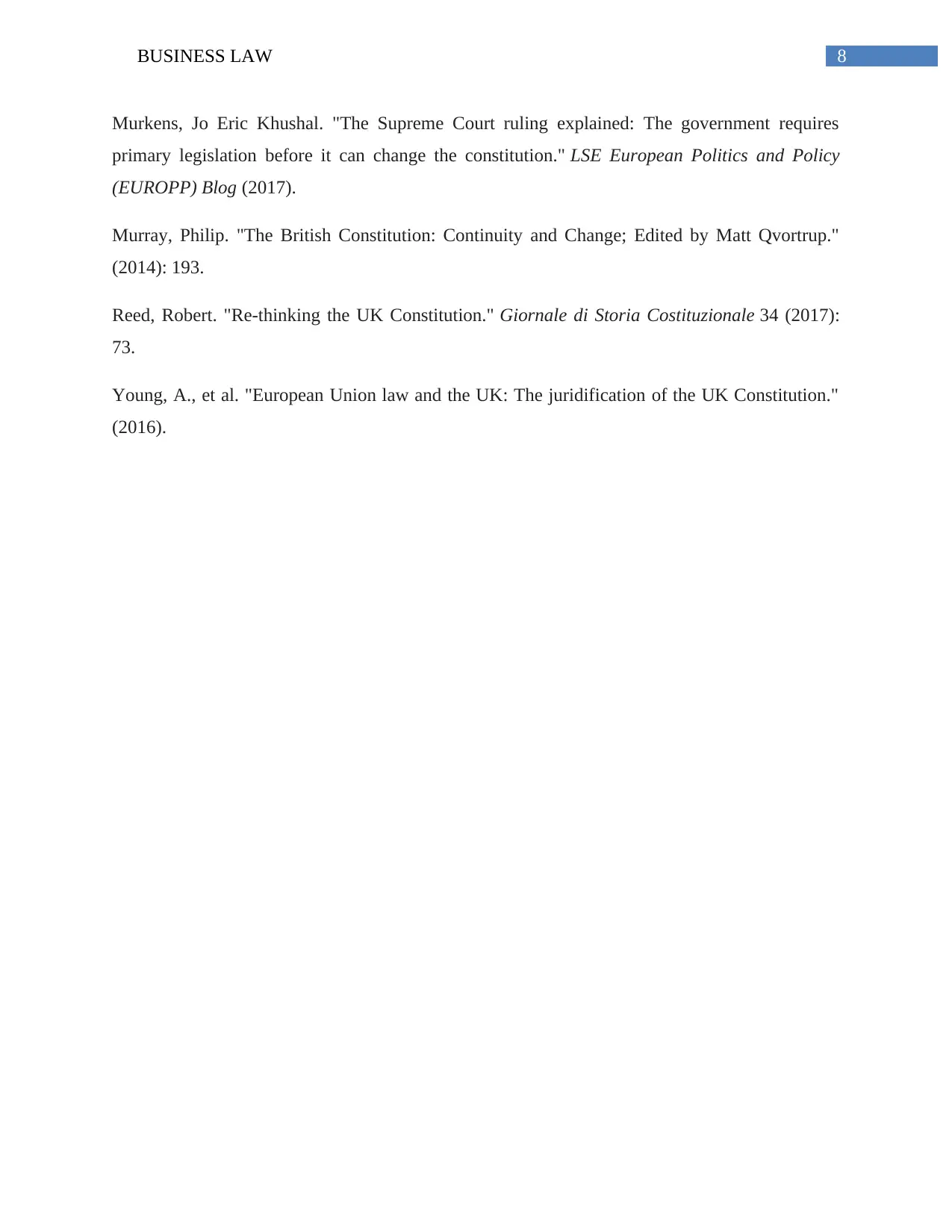
8BUSINESS LAW
Murkens, Jo Eric Khushal. "The Supreme Court ruling explained: The government requires
primary legislation before it can change the constitution." LSE European Politics and Policy
(EUROPP) Blog (2017).
Murray, Philip. "The British Constitution: Continuity and Change; Edited by Matt Qvortrup."
(2014): 193.
Reed, Robert. "Re-thinking the UK Constitution." Giornale di Storia Costituzionale 34 (2017):
73.
Young, A., et al. "European Union law and the UK: The juridification of the UK Constitution."
(2016).
Murkens, Jo Eric Khushal. "The Supreme Court ruling explained: The government requires
primary legislation before it can change the constitution." LSE European Politics and Policy
(EUROPP) Blog (2017).
Murray, Philip. "The British Constitution: Continuity and Change; Edited by Matt Qvortrup."
(2014): 193.
Reed, Robert. "Re-thinking the UK Constitution." Giornale di Storia Costituzionale 34 (2017):
73.
Young, A., et al. "European Union law and the UK: The juridification of the UK Constitution."
(2016).
1 out of 9
Related Documents
Your All-in-One AI-Powered Toolkit for Academic Success.
+13062052269
info@desklib.com
Available 24*7 on WhatsApp / Email
![[object Object]](/_next/static/media/star-bottom.7253800d.svg)
Unlock your academic potential
© 2024 | Zucol Services PVT LTD | All rights reserved.





